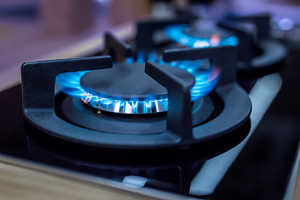 Gas utilities file supply prices–called the Purchased Gas Adjustment (PGA)–each month with the Illinois Commerce Commission (ICC). Here’s what CUB uncovered in our review of prices in January.
Gas utilities file supply prices–called the Purchased Gas Adjustment (PGA)–each month with the Illinois Commerce Commission (ICC). Here’s what CUB uncovered in our review of prices in January.
- Compared with last month, six of 9 major utilities are charging prices that are higher: Ameren (about 0.2 percent higher); Liberty Utilities (about 0.3 percent); Peoples Gas (about 5.4 percent); Illinois Gas (about 10.2 percent); Nicor Gas (about 12 percent); and Mt. Carmel (about 27.6 percent). Prices are lower for three utilities: North Shore Gas (about 0.4 percent lower); MidAmerican Energy (about 4.4 percent); and Consumers Gas (about 6.1 percent).
- Compared with January 2024, seven out of 9 utilities are charging prices that are higher, ranging from about 4.9 percent higher (Peoples Gas) to about 36.3 percent higher (Mt. Carmel). North Shore Gas, the sister company to Peoples Gas, is charging a price that’s about 8.6 percent higher. The two utilities charging lower prices are Nicor Gas (about 17.7 percent lower) and Liberty Utilities (about 22.2 percent). See the list below, comparing the PGAs for this month with a year ago.
January Gas Prices
Ameren Illinois– 45.50 cents per therm (up about 7.4 percent from January 2024)
Consumers Gas– 39.34 cents per therm (up about 30.2 percent from January 2024)
Illinois Gas– 49.40 cents per therm (up about 32.8 percent from January 2024)
Liberty Utilities– 25.12 cents per therm (down about 22.2 percent from January 2024)
MidAmerican Energy– 50.51 cents per therm (up about 16.1 percent from January 2024)
Mt. Carmel– 54.22 cents per therm (up about 36.3 percent from January 2024)
Nicor Gas– 28.00 cents per therm (down about 17.7 percent from January 2024)
North Shore Gas– 44.71 cents per therm (up about 8.6 percent from January 2024)
Peoples Gas– 33.45 cents per therm (up about 4.9 percent from January 2024)
Note: Your utility is determined by where you live, so you cannot switch from one utility to another. Under Illinois law, gas utilities are not allowed to profit off supply prices—they pass those costs from gas producers and marketers onto customers with no markup. State regulators annually review the utilities’ gas-management procedures to evaluate whether the companies did a reasonable job with their gas purchases, given market conditions, to hold down costs for consumers as much as possible.
A few tips from CUB:
- See if you qualify for energy assistance. To apply or learn more about the Low Income Home Energy Assistance Program (LIHEAP), visit this state of Illinois webpage. (Also, check out our Step by step guide to applying for LIHEAP.)
- Keep the lines of communication open with your utility. If you are having trouble affording your gas bills, it is vital that you contact your utility. Ask if you qualify for any energy assistance programs; see if you can set up a plan that gives you more time to pay off your bills; and inquire about no or low-cost energy efficiency programs the company offers.
- Practice energy efficiency at home.
- Beware of alternative supplier rip-offs. If a deal seems too good to be true, there’s a good chance it is. If the utility price increases, remember that it’s due to market factors that also will increase alternative supplier prices. As volatile as gas utility prices are, your best bet for gas supply is likely with your utility and not with an alternative supplier. Read our tips. (Note: Only consumers in Northern Illinois have gas choice.)
- More helpful resources:
- CUB’s Gas page
- Historical gas prices
- CUB’s gas-price reports from 2024: January, February, March, April, May, June, July, August, September, October, November and December.
- If you can, consider moving away from gas: Read our electrification explainer and order CUB’s free Better Heat Guide to learn how to make the transition to more efficient appliances, like electric heat pumps and induction stove tops.

